- Home
- Sophie Jordan
The Duke Goes Down Page 4
The Duke Goes Down Read online
Page 4
“We married as soon as he returned.”
“Little good that does me now.”
“We shall contest this!” His mother struck a fist on the surface of the table, her eyes bright with the impulse to fight.
He’d grimaced, recalling the grim visages of the crown’s agents in his drawing room, armed with documentation that verified the true date of his birth was before his parents’ wedding, an event that took place at a small church in Yorkshire. That alone served as a flag.
Why had his mother not been wed in grand style in St. Paul’s Cathedral in front of hundreds of members of the ton as her sister had done? As her mother had done? As all the previous Dukes of Penning had done?
A small wedding at a remote shire in Yorkshire was certainly not in keeping with tradition or with his mother’s enduring need for spectacle and admiration.
His parents had been married in near seclusion and without pomp because she had been hiding her newborn son from the world.
“You want to contest it?” He shook his head. “Why? Are they mistaken? Was I born after your marriage? Am I legitimate? Am I not a bastard? That is the only point that matters here.”
She glared at him in mute frustration, her lips pressing together mutinously. “It is not right.”
“And yet it is indisputable.”
They would not take on the laws of primogeniture and win. Surely she knew that. Certainly she was not so arrogant to believe she was an exception to long-standing tradition and the rules that governed their land?
She stabbed a finger toward him. “You are not the only one affected here, Peregrine.”
He blinked at her sudden attack on him.
“Oh, the shame.” She pressed her hands to her flaming cheeks. “Thank Providence your sister is already married to Geston and can weather this.”
“Indeed,” he’d said wryly. “Thank Providence for Thirza’s good fortune.”
At least one of his parents’ offspring would be untouched by the day’s revelations. But then Thirza was the legitimate one. She had nothing to fear other than the barest tangential shame. Her marriage to the Earl of Geston would spare her the worst of the damage. Thirza’s mother-in-law was a great friend of the queen, after all.
His mother had looked at him with sudden dawning horror. “What of me? You don’t think I shall lose my title and widow’s jointure, do you?”
In that moment, he could have been justly scathing toward his mother who had so little thought for him and his ruin, but he did not possess the inclination.
It took energy to be angry and hostile, and he found he lacked the will. It had already been an emotionally fraught day.
Instead, he had marched across the room and sank down across from his mother. He reached between them and took her hand, giving it a comforting squeeze. “You will be fine.”
And he was correct.
She was fine.
Even though it was well within the crown’s right to strip her of her title as the Duchess of Penning for her involvement in the fraud, no one wanted to drag things out in so dramatic and punitive a fashion. It would be a public embarrassment for all. So Mama had weathered the backlash.
She fortunately retained her widow’s jointure, and most of her friends stood by her. They weren’t so spiteful as to hold against her an indiscretion from almost thirty years ago—not when she ultimately married the man in question. Besides . . . if they renounced her then they would not be privy to all the despair in her life—or rather, in Perry’s life. They wanted a front-row view for that spectacle. Shunning Mama would prevent them from that pleasure.
As predicted, his sister was saved and untouched by the disgrace. She was actually even more popular than ever—still the darling of the ton. Everyone wanted to be close to her to hear all the juicy bits of her brother’s downfall.
Whereas his mother and Thirza were spared, there was nothing to be done for Perry.
Perry wholly and fully felt the sting of his life going up in smoke all around him. The smoke was still all around him. Most days he struggled through the haze.
Thurman was still talking as Perry dragged his attention back to him.
His mother’s butler was shrugging. “If the baroness’s daughter does not come to fruition, then we shall move on to the Blankenship lasses.”
Ah, the giggling Blankenship chits.
The sisters might possess significant dowries, but they lacked rank, which had been a priority once. He winced at his complete about-face. It made him feel an arse—but that was nothing new. He’d generally felt like an arse these days. Ever since the wretched truth of his illegitimacy had come out.
It did not occur to Mama or Thurman that these heiresses might want more for themselves now that he had . . . well, nothing.
The Blankenship sisters had been kind enough to his face, as were most people, but who knew what they really thought and what they said behind closed doors.
No one in Shropshire had rebuffed him directly. Perhaps it was because his mother still occupied the dower house and was an important personage in the community. Or perhaps the residents of Shropshire were genuinely kind and accepting in true Christian spirit.
Except her.
Ironically, the vicar’s daughter treated him to her usual disdain. She was nothing like the kind and accepting residents of Shropshire or her benevolent father in that regard.
Miss Imogen Bates had always managed to look down her nose at him even though he stood a good half foot taller. She had not concealed her distaste for him—not since they were children and his mother had forced him to spend afternoons with the vicar’s daughter whilst his father and the vicar engaged in long philosophical conversations. What lad wanted to spend the day with a girl? Especially a priggish one who never wanted to do the things he wanted to do.
“And if the Blankenship lasses do not come to scratch, then we shall move down the line.”
Perry wasn’t even certain what—or whom—was down the line, but he was certain he would be told. Ever since he’d moved in with his mother, she and Thurman had resumed old habits. They treated him like a green lad who needed instruction on every matter—from how to attire himself to which ladies he should court. It was unendurable and yet he’d put up with it ever since he’d been evicted from his properties.
“Of course.” Perry gave a two-fingered salute. Unless he wanted to permanently spend his days residing with his mother in the dower house, he had best heed their advice and consider any young lady touting a dowry. That was the sad truth of matters.
Bloody hell.
Perry started eyeing the bottles to his right, desperate for another drink to numb his mind from the bleakness of his life.
He had no wish to spend the rest of his life leeching off his mother. Rather, he amended, the rest of her life. Her widow’s jointure would see her through the rest of her days, and she was granted the dower house until her passing. There was no provision for him, however.
He’d been raised a duke.
He’d been told he was the duke.
That had been the provision left to him. That was his legacy.
All lies.
The dukedom belonged to another and Perry was on his own, without property. Without funds. With only his wits and the strength of his two hands and the charity of his mother. He winced.
His gaze fell on the discarded paper again where the betrothal of Lady Circe to the Earl of Westborough was stamped in ink for the world to see. He squeezed his eyes tightly shut for one long blink as though the sight pained him. When he opened them again, the portentous words were still there. Irrefutable.
He swallowed against the bitter taste coating his mouth, longing to open one of the fresh bottles surrounding him, but he resisted the impulse. He’d imbibed enough for the night. He needn’t drink himself to oblivion. That was the act of a desperate man. He was not that. All was not lost. He would persevere. He would find another heiress. His life would improve. Somehow. He would make certain of t
hat.
“Did, er . . . nothing untoward happen yesterday when you were in the village?” Thurman queried.
Perry considered that for a moment. The question seemed rather arbitrary, which was not a word he would have applied to the rigid butler in any sense. If one word could be applied to Thurman, it was deliberate. “Why do you ask?”
“You did nothing to offend anyone whilst there?”
Perry contemplated that, playing the morning over in his mind. “No. Not to my knowledge.” True, it was not in his habit to consider how others might perceive him, but certainly he would know if he had caused offense to others when he was out and about.
“Think on that a bit,” Thurman prompted, clearly convinced Perry should recollect.
“What are you getting at, Thurman? Speak plainly, man.”
“There have been . . . stories circulating.”
“Stories?”
Thurman appeared discomfited. A definite first for the man. He might not be nobility, but he carried himself with more hauteur than a king. “They would best be described as . . . rumors, I fear.”
“Rumors?” he echoed. “Since yesterday?” He snorted. “I attended church with my mother. No more than that. What could have happened that was so scandalous in such a short passage of time?”
“I would not say these rumors are scandalous precisely . . . merely unfortunate for the subject. And in this case, the subject is you.”
“Me?” He pointed to himself with bewilderment. “Well, out with it, man.”
“It is purported that you wear a wig and are stark bald beneath.”
“Bald?” He reached for his hair and tugged fistfuls of his thick locks. “Does this look like a bloody wig to you?”
“All rubbish, certainly.” Thurman nodded forcefully.
Perry released his hair. “What else? What else is being said about me?”
“Nothing too . . . damaging.”
“Thurman,” he warned. There was clearly more.
“Only that you possess twelve toes.”
He shot up straight, his outrage a lightning bolt to his spine. “S-slander!” he sputtered.
The only thing Perry had going for him was his charm and appearance and now that was under attack, too. Brilliant.
Thurman lifted one shoulder in a shrug. “In ancient times, it was believed a sixth toe was a blessing reserved for kings.”
“Except it does not apply to me because I have five toes on each foot.” He waved angrily to his boots.
“And there are those who believe it to be a witch’s curse,” Thurman admitted, still continuing as though Perry did, in fact, possess extra toes.
“With my recent misfortune, I am certain there are more than a few people who believe me cursed.”
He dropped his head back against the wall with a thunk. “What am I going to do?”
The question was posed more for himself, but Thurman answered. “You’ll go to the Blankenship ball and waltz so closely with every heiress present so that they will have no doubt you’re in possession of a full head of hair.”
“What of this twelve toes nonsense?”
Thurman made a sound in his throat that reflected how little he thought of that rumor. “Nonsense indeed. And if it were true, who really cares about one’s toes?”
“Ladies,” Perry snapped. “Ladies care about toes. Especially the ones who are superstitious when it comes to extra ones.”
Thurman shrugged. “And I am assuming this bad kissing business is a rumor, too.”
“Bad kissing?” he demanded.
Thurman blinked. “Did I not mention that is also being bandied about?”
Indignation swelled up in him, threatening to choke him. “No, my good man, you failed to mention that.”
“Oh.” Another shrug from Thurman. “I did not think it overly significant compared to the other rumors.”
Not overly significant that he was a bad kisser?
Perry lowered his head into his open palm. That ranked as significant to him. To females, too, he knew, it ranked as extremely significant. “The ladies tend to care about that, Thurman.”
Thurman offered up yet another unhelpful shrug and gestured toward the stairs leading from the cellar. “Dinner, if you remember, sir? Please do not keep your mother waiting. She abhors tardiness.” With that, the butler turned and took his leave.
Bad kisser?
Perry’s ego stung from that. Perhaps more than it should have, but that was one complaint that had never been lodged against him, and London was a place where gossip thrived. If such tittle-tattle had been spun about him among the ton, it would have reached his ears in record time. As, apparently, it had done here in Shropshire. Gossip was gossip everywhere. He grimaced at that cold truth.
This bad kisser rumor was perhaps the most damaging one of all. He had to clear his reputation on that matter. He needed to prove his kissing prowess and soon, so that the eligible ladies of Shropshire knew that particular rumor bore no substance. Of course, it meant finding a candidate who would not mind advertising the fact that she had kissed him. Not necessarily an easy task.
Again, the idea of uprooting himself and seeking his fortune on some far distant shore dangled before him and the notion was not without merit.
In either circumstance, staying here or leaving, he would have to prove himself. That much was undeniable.
Staying, he would have to see about tackling all of these rumors and doing his best to quell them. Finding the source seemed the most obvious solution. Find the culprit and stop him.
Or, most likely, stop her.
Chapter Four
The Blankenship ballroom was crowded with all of Shropshire.
As in years before, it was a delightful country ball. Extraordinary, really. It was the only of its kind, Imogen suspected, where yeomen and tradesmen and their families mingled alongside the shire’s well-heeled gentry: dancing, drinking, eating until one was red in the face.
The finest silks merged with the poorest of wools. The Blankenships did not discriminate. Class distinction was not observed at these affairs. Once a year the tables groaned beneath enough food to feed two villages. Even with Mr. Henry and his insatiable appetite present.
The slovenly man owned a small pig farm just outside of town, and from the state of his muddy boots and soiled trousers, he had not likely freshened his clothing before he quit his pig stalls for the day and ventured forth tonight. Mr. Blankenship really was singular in his ability to overlook such a man tromping mud—and other substance Imogen dared not examine too closely—all over his floors.
She watched him with a faintly curling lip. As an agent of the shire’s vicarage, she knew she was supposed to serve all the denizens of Shropshire with goodwill and love in her heart. However, she held no goodwill in her heart for this man.
He sat at a table, waited upon most diligently by his wife, a woman very much with child. Their eleventh child, in fact. Although that did not stop the man from snapping his greasy fingers for her to hurry and fetch him yet another plate of food.
Mrs. Henry had been with child every year since Imogen and her parents moved here. As soon as one baby arrived another was on the way. Mama had oft grumbled that some men in life were as feral as beasts of the field and could not be civilized.
Mama had helped in the delivery of several of Mrs. Henry’s babes whilst Imogen helped with the children—a task that their own father felt too beneath him. Mr. Henry usually sat drinking his ale and stuffing whatever food Imogen and her mother had brought into his mouth, leaving scarcely enough for his own children no matter how generously they had packed the basket.
Aside from her burgeoning belly, Mrs. Henry was thin as a reed, her features haggard this evening. Her hair fell untidily from pins into her face. Or perhaps that was a deliberate attempt to disguise the bruise purpling her eye. Imogen noticed it though. Just as she had noticed all of Mrs. Henry’s bruises and scrapes over the years. This one did not escape her detection either.
Whenever Imogen inquired about them, the farmer’s wife always had some excuse: a fall, a collision with a door, one of the little ones threw a spoon and struck her.
Imogen did not believe a single one of her excuses.
Unlike his wife, Mr. Henry possessed great ham-sized fists and was a bear of a man with a large belly that pushed against his too-snug vest and jacket. He tore into a turkey leg with his teeth as though it had wronged him and he wished to punish it. Just the sight of him made Imogen wish she were a man with the power to punish him so that he never lifted a finger to his hapless wife again.
Imogen tore her gaze from the detestable farmer and scanned the room. A cornucopia of lanterns cast everyone’s faces in a merry yellow glow as the orchestra played a lively tune. Mercy’s younger sister, Grace, called out a greeting as she whirled past in a spirited reel. Imogen waved after her.
Miss Lockhart, the housekeeper up at Penning Hall, was in on the fun, too. She whirled past in Mr. Blankenship’s arms.
Papa applauded Mr. Blankenship for hosting these affairs, and had done so ever since they first moved here years ago. He praised him quite effusively from the pulpit for organizing occasions that unified the community. Some might say it was just good sense to sing the praises of a man as wealthy and influential as Mr. Blankenship, that it could only work to the benefit of the village and the good vicar. And yet Papa did not think like that. He was not after his own gain. His mind did not work for selfish purposes.
However, Imogen did not agree with her father. Contrary to what he said, the Blankenship ball did not unify all of Shropshire society—not that Imogen contradicted her dear Papa on that point.
Delightful occasion or not, the late Duke of Penning had never graced any of the Blankenship balls. He might have invited the Blankenships up to the grand manor house for an occasional fete, but that was different. The late duke could invite whomever he wanted into his space. He had the right to pick and choose. He was a duke. He could do anything he wanted—but what he clearly never wanted to do was mingle with the many varied denizens of Shropshire in the Blankenship ballroom.

 Uninvited
Uninvited The Duke Buys a Bride
The Duke Buys a Bride Hidden
Hidden Breathless
Breathless Hell Breaks Loose
Hell Breaks Loose Wicked in Your Arms
Wicked in Your Arms The Earl in My Bed
The Earl in My Bed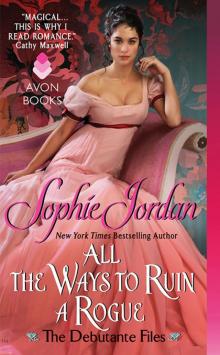 All the Ways to Ruin a Rogue
All the Ways to Ruin a Rogue Sins of a Wicked Duke
Sins of a Wicked Duke Beautiful Lawman
Beautiful Lawman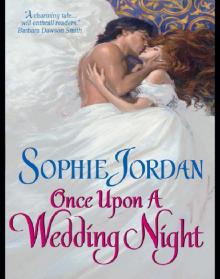 Once Upon a Wedding Night
Once Upon a Wedding Night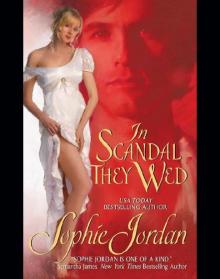 In Scandal They Wed
In Scandal They Wed Vanish
Vanish Rise of Fire
Rise of Fire Firelight
Firelight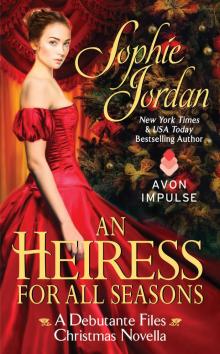 An Heiress for All Seasons
An Heiress for All Seasons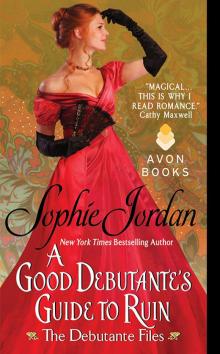 A Good Debutante's Guide to Ruin
A Good Debutante's Guide to Ruin Fury on Fire
Fury on Fire All Chained Up
All Chained Up Foreplay
Foreplay The Scandal of It All
The Scandal of It All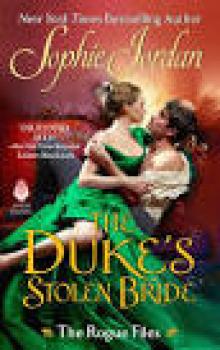 The Duke's Stolen Bride
The Duke's Stolen Bride Unleashed
Unleashed Reign of Shadows
Reign of Shadows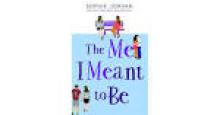 The Me I Meant to Be
The Me I Meant to Be One Night With You
One Night With You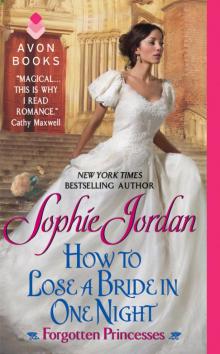 How to Lose a Bride in One Night
How to Lose a Bride in One Night Tease
Tease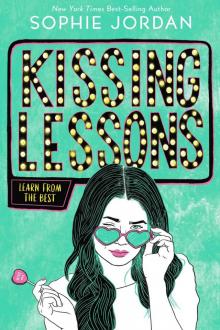 Kissing Lessons
Kissing Lessons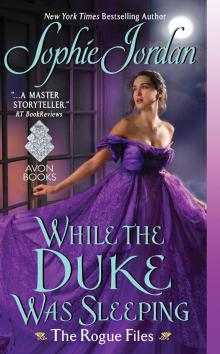 While the Duke Was Sleeping
While the Duke Was Sleeping Wild
Wild This Scot of Mine
This Scot of Mine Foreplay: The Ivy Chronicles
Foreplay: The Ivy Chronicles Firelight with Bonus Material
Firelight with Bonus Material The Duke Goes Down
The Duke Goes Down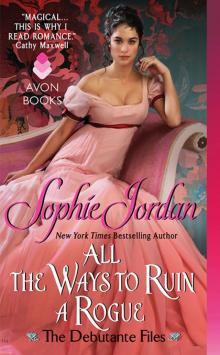 All The Ways To Ruin A Rogue (The Debutante Files Book 2)
All The Ways To Ruin A Rogue (The Debutante Files Book 2) Wicked Nights with a Lover
Wicked Nights with a Lover Firelight f-1
Firelight f-1 Beautiful Sinner
Beautiful Sinner Surrender to Me
Surrender to Me Scandal of It All
Scandal of It All Vanish f-2
Vanish f-2 Vanish: A Firelight Novel
Vanish: A Firelight Novel The Earl in My Bed: A Forgotten Princesses Valentine Novella
The Earl in My Bed: A Forgotten Princesses Valentine Novella